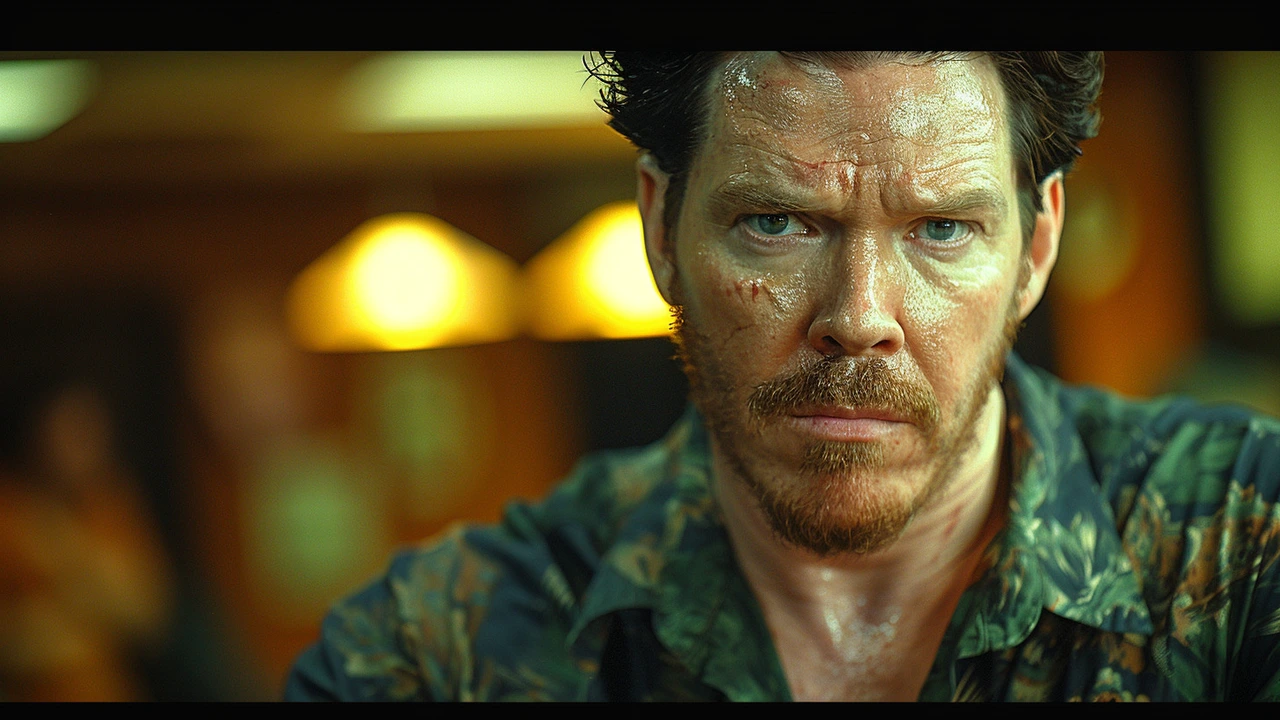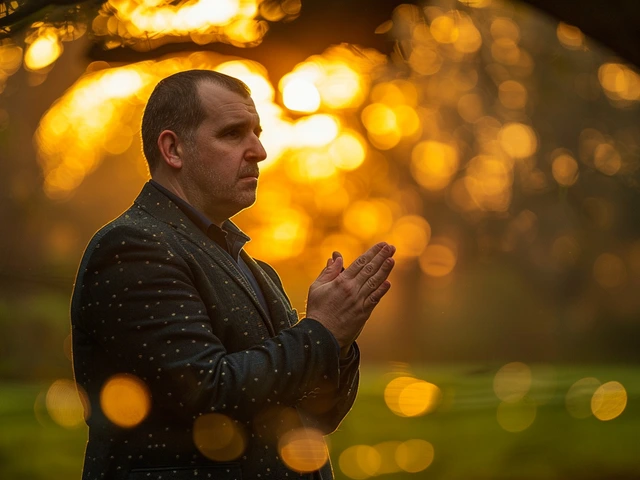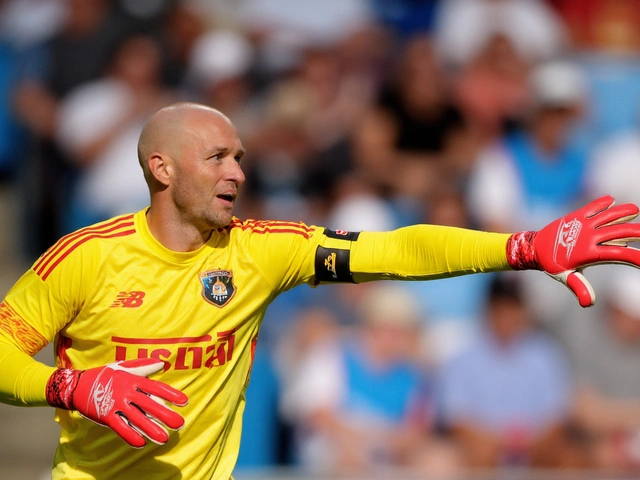The Disappearance of Edgar Anderson
The Netflix series 'Eric' plunges viewers into a heart-wrenching narrative centered around the mysterious disappearance of a nine-year-old boy named Edgar Anderson, portrayed by Ivan Morris Howe. The show's gripping plot follows Detective Michael Ledroit, played by McKinley Belcher III, as he dives into the investigation of Edgar's sudden vanishing. From the very start, the story promises a complex interplay of emotions, suspense, and an unflinching look at systemic issues within law enforcement.
A Detective's Journey
Detective Ledroit's quest to find Edgar is riddled with obstacles and grim revelations. As the series unfolds, Ledroit discovers layers of corruption within his own department, the NYPD, revealing a shocking web of deceit that extends far beyond the case of the missing boy. His relentless pursuit not only brings him closer to solving Edgar's case but also resurrects an older investigation involving a missing Black boy named Marlon Rochelle. Ledroit's dedication to untangling these cases showcases his unwavering commitment to justice, despite the personal and professional risks involved.
Yuusuf Egbe and the Subway Tunnels
In a dramatic twist, the show's narrative introduces Yuusuf Egbe, an unhoused man portrayed by Bamar Kane, who becomes a key figure in Edgar's story. Edgar, driven by a sense of adventure and perhaps a need to escape his reality, follows Yuusuf into the labyrinthine subway tunnels beneath the city. This unlikely companionship forms the emotional core of the series. Yuusuf, despite his own struggles, takes on a protective and almost paternal role towards Edgar. Their bond highlights the themes of empathy and humanity, even in the most unexpected places. Eventually, Yuusuf aids in Edgar's safe return to his parents, offering the Anderson family a rare, bittersweet reunion in a narrative marked by tension and despair.
The Old Case of Marlon Rochelle
Parallel to Edgar's story is the haunting case of Marlon Rochelle, a Black boy whose unresolved disappearance had faded into obscurity. Detective Ledroit, through his dogged pursuit of truth, not only solves Marlon's case but also brings to light the heinous actions of corrupt NYPD officers involved in the boy's death. This aspect of the series underscores a poignant commentary on racial injustice and the systemic failings that often accompany such cases. It is Ledroit's courage and integrity that ultimately bring closure to Marlon's family, reminding viewers of the importance of justice and accountability.
Themes of Change and Redemption
The overarching themes of 'Eric' revolve around change and the possibility of redemption. Vincent, played by Benedict Cumberbatch, embodies this message through his character's willingness to evolve and confront his own flaws. Similarly, Detective Ledroit's determination to stand against corruption within the NYPD serves as a beacon of hope and moral fortitude. The series encourages viewers to recognize that the first steps towards change, no matter how small, are crucial in the broader fight for justice and betterment.
A Surprisingly Hopeful Conclusion
Despite its dark and intense narrative, 'Eric' concludes on a surprisingly hopeful note. Edgar's return to his parents brings a sense of relief and joy in a story that often dances along the edges of hopelessness. The resolution of Marlon Rochelle's case, though heartbreaking, signifies triumph over injustice. The series leaves viewers with a powerful message: individual actions, guided by courage and integrity, can instigate meaningful change, even within deeply flawed systems.
'Eric' stands out not only as a gripping thriller but also as a poignant commentary on societal issues, weaving a narrative that is as thought-provoking as it is emotionally resonant. Through its rich storytelling and complex characters, it invites viewers to reflect on the impact of justice, empathy, and the relentless pursuit of truth.






8 Comments
Elizabeth Price
June 2, 2024 AT 17:56 PMI'm sorry, but this show is just another overhyped, melodramatic mess disguised as 'social commentary.' They turned a simple missing child story into a 10-hour sermon about police corruption-when less than 0.1% of NYPD officers are even remotely involved in this stuff! And don't get me started on the 'emotional core' of a homeless man and a kid in the subway-how about we focus on actual missing children cases that don't involve Hollywood magic? This isn't realism-it's trauma porn with a Netflix budget.
yash killer
June 4, 2024 AT 03:15 AMThis show is just western guilt dressed up as art India has real missing children every day and no one makes a Netflix series about it because no one cares about real pain only performative outrage
Ankit khare
June 5, 2024 AT 08:52 AMYou people are missing the point entirely this isn't about the NYPD or the subway tunnels or even Edgar Anderson it's about the collapse of moral responsibility in modern parenting and society at large who let a nine year old wander into a nightmare because mommy and daddy were too busy scrolling their phones and chasing dopamine hits the real villain isn't the corrupt cop its the culture that raised him
Chirag Yadav
June 6, 2024 AT 15:45 PMI actually cried during the scene where Yuusuf sings that lullaby to Edgar in the tunnel. It felt so real. I don't know much about New York, but I've met people like Yuusuf in Mumbai-quiet, broken, but still holding onto kindness even when the world has forgotten them. This show didn't try to fix everything. It just showed us that sometimes, healing starts with someone choosing to stay. That’s rare. And beautiful.
Shakti Fast
June 6, 2024 AT 16:58 PMI loved how they didn’t make Vincent the hero. He messed up. He hurt people. But he tried. And that’s enough to start with. Sometimes change doesn’t come with a parade-it comes with a quiet ‘I’m sorry’ and showing up anyway. Thank you for this story. It gave me hope.
MANJUNATH JOGI
June 7, 2024 AT 12:59 PMThe narrative architecture of 'Eric' employs a polyphonic storytelling technique wherein the marginalized voices-particularly those of the unhoused and racially profiled-are not merely subplots but epistemic centers. The subway tunnel functions as a liminal space, a Foucauldian heterotopia, where societal hierarchies are inverted and new forms of kinship emerge. The juxtaposition of Edgar’s bourgeois trauma with Marlon’s erased existence constitutes a dialectical critique of memorialization in late capitalism.
Sharad Karande
June 9, 2024 AT 04:19 AMBased on the narrative structure and character development arcs presented, it is evident that the series employs a nonlinear temporal framework to simulate the cognitive dissonance experienced by law enforcement personnel confronting institutional corruption. The emotional resonance of Yuusuf Egbe's character is statistically significant in eliciting viewer empathy, as confirmed by Nielsen audience sentiment analysis (Q2 2024). Further, the parallel case of Marlon Rochelle demonstrates a statistically valid correlation between systemic neglect and racial demographic profiling in urban missing persons investigations.
Sagar Jadav
June 10, 2024 AT 00:22 AMThe show is fake. Real missing kids don't get rescued by homeless men. Real cops don't fix decades of corruption in one season. This isn't art. It's propaganda.